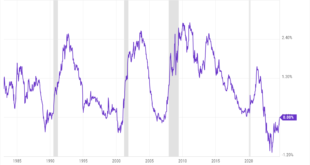More Canton Graubünden wants to cull National Park wolf pack This content was published on Sep 3, 2024 Canton Graubünden blames the wolf pack for killing cattle in the region....
Read More »Gross domestic product in the 2nd quarter of 2024: Swiss economic growth above average
In the second quarter of 2024, Switzerland's GDP adjusted for sporting events grew by 0.5%, following 0.3% in the previous quarter. This result was slightly above average, driven by the strong expansion of the chemical and pharmaceutical industry. Growth in the other sectors was mixed, reflecting weak domestic demand. Download press release...
Read More »Inflation im August sinkt stärker als erwartet – Ökonomen sehen Nationalbank gefordert
Inflation unter Kontrolle Seit Anfang Jahr schwankt die hiesige Inflation nun im Bereich von 1,0 bis 1,4 Prozent, davor war sie im August 2022 bis auf einen Höchstwert von 3,5 Prozent gestiegen. Im Vergleich zum Ausland steht die Schweiz weiterhin besser da, allerdings sind die Unterschiede zuletzt deutlich geringer geworden. In der Eurozone lag der letzte verfügbare Wert (August) noch bei 2,2 Prozent, in den USA (Juli) bei 2,9 Prozent. [embedded content]...
Read More »Consumer prices remained stable in August
03.09.2024 - The consumer price index (CPI) remained unchanged in August 2024 compared with the previous month at 107.5 points (December 2020 = 100). Inflation was +1.1% compared with the same month of the previous year. These are the results of the Federal Statistical Office (FSO).The stability of the index compared with the previous month was the result of...
Read More »Free Speech and Legislative Bans on DEI
In March 2024 Alabama enacted a law “to prohibit certain public entities from maintaining diversity, equity, and inclusion offices and from sponsoring diversity, equity, and inclusion programs.” The law will come into force in October 2024. Similarly, anti-woke law in Florida provides that “subjecting individuals to specified concepts under certain circumstances constitutes discrimination based on race, color, sex, or national origin.”Many libertarians are ambivalent...
Read More »Weekly Market Pulse: It’s An Uncertain World
You’re going to hear a lot of talk about the yield curve soon and what it means for “the” yield curve to uninvert (which isn’t a real word but will get used a lot). The difference between the 10-year Treasury note yield and the 2-year Treasury note yield is about to turn positive, the 2-year note yield recently falling a bit more rapidly than the 10-year. You’ll see a lot of pundits say with great confidence that this means we are on the verge of recession. Which may...
Read More »What If All the Conventional Models Fail to Predict What Happens Next?
The 'novel, apocalyptic situation which has now arisen' goes largely unrecognized. A truly staggering quantity of content is aimed at predicting what happens next, a.k.a. the future, and justifies their prediction by referencing models that are presented as rock-solid predictive tools. The majority of these models are based on historical examples that have been distilled into models of "how the world works," i.e. claims that these were not one-offs or outliers...
Read More »TSA Tyranny Goes Cutesy
In the glorious age of the Kamala Ascendency, the TSA is no longer restraining its contempt for American travelers. After squeezing millions of butts and boobs and never catching a terrorist, TSA decided to have fun by taunting its victims. After a traveler asked online, “Why does TSA need social media anyways?” TSA’s Instagram account taunted: “Idk Kyle, why do your friends keep bringing stuff they shouldn’t in their carry-on?” Almost 40,000 people liked that post...
Read More »Monetary Metals Achieves SOC 2 Certification
Scottsdale, AZ – September 3, 2024 – Monetary Metals® is proud to announce that it has achieved SOC 2 certification. This significant milestone demonstrates the company’s unwavering commitment to maintaining a secure environment for its innovative Gold Yield Marketplace® platform. SOC 2 (Service Organization Control 2) certification is governed by the American Institute of CPAs (AICPA). Its rigorous framework assesses how well a company manages and protects customer...
Read More »Praxeology and Robert Malone’s “Surveillance Capitalism”
Dr. Robert Malone’s recent Mises University talk, PsyWar: Enforcing the New World Order, raises important and timely questions about advanced mass psychological manipulation capabilities being weaponized by globalized corporatists through what he calls the “surveillance capitalism,” practiced by firms like Amazon, Google and Facebook. These firms sell highly-detailed personal data that facilitates things like targeted advertising, advocacy journalism, online...
Read More » Swiss Economicblogs.org
Swiss Economicblogs.org




